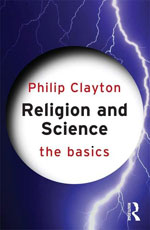Philip Clayton is Ingraham Professor and Dean of Claremont School of Theology, and Provost at Claremont Lincoln University, USA. Author and editor of some 20 books, he is widely recognized internationally as a leading figure in the field of religion and science. Clayton proves himself to be a gracious and imaginative guide to these two social forces which are popping up in debates about the ethical and moral issues of our times. The author does not present answers to the questions coming up in these discussions but encourages us in the way of many contemporary Buddhists to "sit with the questions."
After presenting a fascinating debate between a naturalist (defending science) and a theist (defending religion), Clayton moves on to an overview of the clash between proponents of Intelligent Design and the New Atheists. The first is backed by over 50 percent of American evangelicals who are fierce opponents of Darwinian evolution. Intelligent Design also has enthusiastic support in the Muslim world. The "us" versus "them" stance on both sides does not provide the openness that is required for a more enlightened approach to religion and science.
Clayton does us all a real service by showing us various ways in which other religions (Judaism, Islam, Hinduism, and Buddhism) respond to science beyond "the battle mode." Buddhists have been especially hospitable to scientific findings and the mutual learning that can come from religious people and scientists meeting together.
Clayton hits high stride in the closing chapters with assessments of the religious interest in cosmology, the interplay between quantum physics and consciousness, questions about the uniqueness of human beings, and neurological findings about religious experience. He also covers how scientists and religious devotees are approaching the controversial topics of stem cell research, ethical issues at the end of life, the rights of subjects in scientific experiments, warfare technologies, designer drugs, and AI (artificial intelligence).
The author comes up with five possible ways to handle the relationship between science and religion. We concur with Clayton's suggestion of an ongoing partnership between these cultural forces. We appreciated his delineation of the positive qualities various religions can bring to the table in future collaborations. One area where dialogue is desperately needed is in dealing with today's serious environmental crisis.
